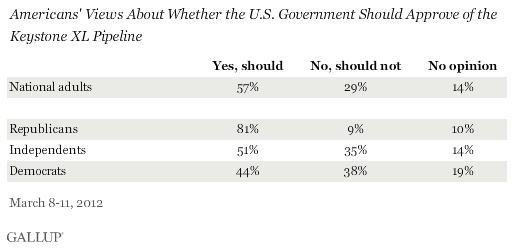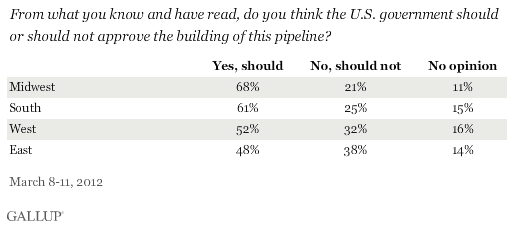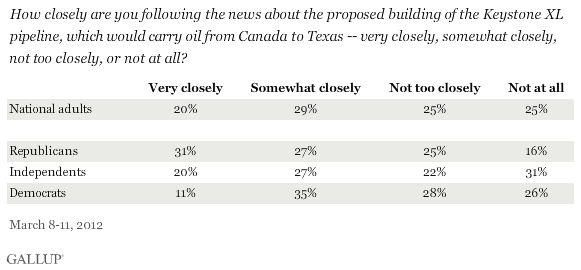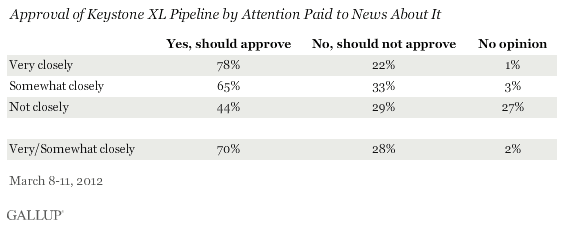WASHINGTON, D.C. -- A solid majority of Americans think the U.S. government should approve of building the Keystone XL pipeline, while 29% think it should not. Republicans are almost twice as likely as Democrats to want the government to approve the oil pipeline. About half of independents also approve.

These data were collected as part of Gallup's annual Environment survey, conducted March 8-11, 2012. The Keystone XL oil pipeline is a politically divisive project, which President Obama and the Republicans in Congress have been battling over. The proposal from TransCanada Corporation for building a pipeline to carry crude oil from Canada down to the Gulf of Mexico, first made in 2005, needs approval from the U.S. president because it crosses an international border. The Republicans in Congress inserted a provision on the pipeline in the payroll tax extension bill late last year, but in January, President Obama rejected TransCanada's permit entirely. However, the administration is allowing TransCanada to reapply for the permit it needs.
The pipeline would travel through the Midwest and the South, and Americans in those two regions are the most likely to approve of the project. Nearly 7 in 10 Midwesterners want the government to approve the building of the pipeline and 61% of those in the South do as well. There has been discussion in Washington and in the media about the potential new jobs the pipeline project would create, which may partly explain the higher support seen in those regions. Americans in the West and East are less likely to approve.

Americans, however, are not as tuned in to news about the pipeline as they have been to past major events in the news. About half say they are following news about the pipeline very or somewhat closely, slightly less than the average of 60% Gallup finds for attention paid to news events historically.
Republicans are more likely than Democrats or independents to say they are following news about the pipeline very closely.

Even though the pipeline would have the most direct effect on states in the Midwest and South, residents there are no more likely than those in the East or West to be following news about it closely.
Those Following News About Pipeline Highly Supportive
Americans who say they are very closely following news about the Keystone XL pipeline overwhelmingly think the government should approve the building of it, 78% to 22%. About a quarter of those who are not following news of it closely don't have an opinion on the issue. But among those who do, more think the government should approve (44%) than disapprove (29%) it.

Bottom Line
President Obama this week set out on a two-day multistate trip to promote his energy strategy, including reducing America's dependence on foreign oil. As part of his trip, Obama on Thursday will visit Cushing, Okla., the place where the southern portion of the Keystone XL pipeline would begin. There he will announce that his administration will expedite the permit process for the southern half of the pipeline, which does not need his specific approval.
TransCanada says this part of the pipeline will help it relieve a bottleneck of oil in Oklahoma. But Republicans in Congress have already criticized the president's yet-to-be-made announcement, with a spokesman for House Speaker John Boehner telling MSNBC it is an "attempt to take credit" for the pipeline, and that the southern part "is being built in spite of the president, not because of him."
Regardless, the northern part of the pipeline, which does require the president's approval, has still not been approved. The majority of Americans, though, say they want the government to allow the pipeline to be built. So, most would likely support any attempt by the president to move the pipeline forward.
Survey Methods
Results for this Gallup poll are based on telephone interviews conducted March 8-11, 2012, with a random sample of 1,024 adults, aged 18 and older, living in all 50 U.S. states and the District of Columbia.
For results based on the total sample of national adults, one can say with 95% confidence that the maximum margin of sampling error is ±4 percentage points.
Interviews are conducted with respondents on landline telephones and cellular phones, with interviews conducted in Spanish for respondents who are primarily Spanish-speaking. Each sample includes a minimum quota of 400 cell phone respondents and 600 landline respondents per 1,000 national adults, with additional minimum quotas among landline respondents by region. Landline telephone numbers are chosen at random among listed telephone numbers. Cell phone numbers are selected using random-digit-dial methods. Landline respondents are chosen at random within each household on the basis of which member had the most recent birthday.
Samples are weighted by gender, age, race, Hispanic ethnicity, education, region, adults in the household, and phone status (cell phone only/landline only/both, cell phone mostly, and having an unlisted landline number). Demographic weighting targets are based on the March 2011 Current Population Survey figures for the aged 18 and older non-institutionalized population living in U.S. telephone households. All reported margins of sampling error include the computed design effects for weighting and sample design.
In addition to sampling error, question wording and practical difficulties in conducting surveys can introduce error or bias into the findings of public opinion polls.
View methodology, full question results, and trend data.
For more details on Gallup's polling methodology, visit www.gallup.com.
